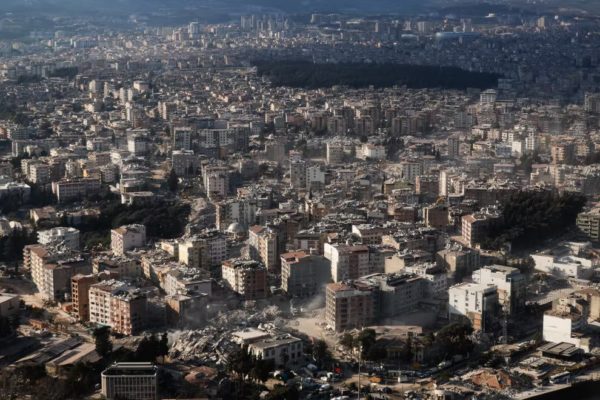GENERAL NEWS
Earthquake strikes Turkey-Syria border two weeks after devastating tremors

A 6.4 magnitude earthquake has struck the Turkey-Syria border region, two weeks after deadly tremors devastated the area.
Turkey’s disaster management agency, AFAD, said the magnitude 6.4-earthquake was centered around the town of Defne, in Hatay province, one of the regions hardest-hit by the earlier earthquakes.
The earthquake struck at a depth of 1.2 miles (2km), the European Mediterranean Seismological Centre (EMSC) said, measuring it at 6.3 magnitude. Turkey’s state-run Anadolu Agency said the quake was felt in Syria, Jordan, Israel and Egypt.
NTV television said the quake caused some damaged buildings to collapse, but there were no immediate reports of any casualties. Two Reuters witnesses reported a strong quake and further damage to buildings in central Antakya, the capital of Hatay province.
Muna Al Omar said she was in a tent in a park in central Antakya when the latest quake hit. “I thought the earth was going to split open under my feet,” she told Reuters, crying as she held her 7-year-old son in her arms.
Turkish authorities have recorded more than 6,000 aftershocks since the initial magnitude 7.8 earthquake struck on 6 Feb. It was followed by a second 7.5 magnitude tremor a few hours later. The earthquakes have killed nearly 45,000 people across both Turkey and Syria.
The latest earthquake struck hours after the end of a visit to the country by the US secretary of state, Antony Blinken, who said America would help “for as long as it takes” to rebuild after the deadly earthquakes.
Search and rescue operations for survivors have been called off in a numver of quake zone, but AFAD chief Yunus Sezer told reporters that search teams were pressing ahead with their efforts in more than a dozen collapsed buildings – most of them in Hatay.
There were no signs of anyone being alive under the rubble since three members of one family — a mother, father and 12-year-old boy — were extracted from a collapsed building in Hatay on Saturday. The boy later died.
The death toll in Turkey rose to 41,156, AFAD said, and it was expected to climb further, with some 385,000 apartments in the country known to have been destroyed or seriously damaged and many people still missing.
President Tayyip Erdogan said construction work on nearly 200,000 apartments in 11 earthquake-hit provinces of Turkey would begin next month. There has been plenty of anger across Turkey about the support given to those who have survived the earthquakes, with around 1.6 million people are currently being housed in temporary shelters.
Mr Erdogan, who faces elections in May or June, has also faced critcism over allegations that years of poor construction has contributed to the damage. Mr Erdogan has rejected that his government is to blame and has promised to crack down on developers. Mr Erdogan said that the new residences will be no taller than three or four stories, built on firmer ground and to higher standards and in consultation with “geophysics, geotechnical, geology and seismology professors” and other experts.
“We want to avoid disasters … by shifting our settlements away from the lowlands to the (more solid) mountains as much as possible,” Mr Erdogan said in a televised address during a visit to Hatay province.
Mr Erdogan said around 118,000 buildings either collapsed, required urgent demolition or were severely damaged by the quake. Of the near 200,000 new residences, more than 130,000 in the worst-affected provinces of Hatay, Kahramanmaras and Malatya.
The Turkish leader said destroyed cultural monuments would be rebuilt in accordance with their to “historic and cultural texture.”
In Syria, already shattered by more than a decade of civil war, most deaths have been in the northwest, where the United Nations said 4,525 people were killed. The area is controlled by groups rebelling against President Bashar al-Assad, complicating efforts to get aid to people. Syrian officials say 1,414 people were killed in areas under the control of Mr Assad’s government.
Medical charity Medecins Sans Frontieres (MSF) said a convoy of 14 of its trucks had entered northwestern Syria from Turkey on Sunday to assist in rescue operations, as concerns grow over lack of access.
As of Monday morning, 197 trucks loaded with UN humanitarian aid had entered northwest Syria through two border crossings, a spokesperson for the U.N. Office for the Coordination of Humanitarian Affairs said.
[via]














